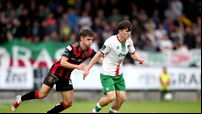Echo 130: Local paper at the heart of 130 years of Cork soccer

Dave Barry celebrates his goal against Bayern Munich with John Caulfield at Musgrave Park.
This gave an international reach to one of Ireland’s greatest local papers. There are many publications in world sport that try to tell the story of the beautiful game.

In 1926 Fordsons beat the odds and defeated Shamrock Rovers 3-2 in the FAI Cup final at Dalymount Park. It was the day that the new Munster Football Association asserted itself nationally.
The first Irish international game held outside Dublin was held at the Mardyke in March 1939.
The biggest day on the Irish football calendar was an all-Cork affair in 1953 when Cork Athletic and Evergreen both reached the FAI Cup final.
Twenty thousand people made the journey to Dalymount Park from Cork. A lot of the talk leading up to the final was about Raich Carter, who had ed Cork Athletic from Hull City. The forward arrived on Leeside as a two-time FA Cup winner after spells with Sunderland and Derby County. He got three goals during Athletic’s run to the final, and he scored the first in the final.

The early 1980s was a grim era for football in Cork.
League of Ireland football returned to Leeside in 1984 with the formation of Cork City.
It is a game that needs no introduction. Cork City, who up until that point, had only played in one European match, were drawn against the most successful team in German football in the Uefa Cup.

In 1999 Roy Keane led Manchester United to a historic treble.
Unfortunately, he missed the final but Denis Irwin played at the Camp Nou against Bayern Munich. The United captain had to watch from the stands as his side scored two injury-time goals to win the biggest prize in European football.

The nation was split in 2002 after Roy Keane was sent home on the eve of the World Cup in South Korea and Japan.
Never has a draw felt so much like a win.
November, 5 2017 is a day that will live long in the memory of football fans on Leeside.
The game went to penalties and after Mark McNulty denied Michael Duffy, Kieran Sadlier converted and City won the cup.











 App?
App?







